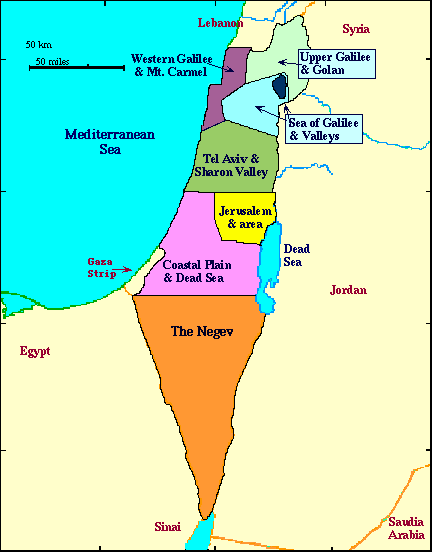
APRIL 2004

this map is on-line www.templebuilders.com/maps,israel.htm.htm
.
From a recent Haaretz article by Ze'ev Schiff, A confused and vague plan, it is possible to take a few indications that Sharon's plan is to leave an irrefutable Palestinian area that cannot be challenged and by making life in the occupied territories insupportable for the West Bank palestinians he takes a final step to achieve the above "corrections" on the Israeli landmaps of our times.
Haarettz - Wed., March 10, 2004
Why are the American envoys returning to Israel, after having been here only a short while ago, in order to find out more about the prime minister's disengagement plan? They recently conferred in Washington with the Prime Minister's Bureau chief, Dov Weisglass, and the director of the National Security Council, Giora Eiland. ........And how to explain the fact that not only was Weisglass pleased with the way the talks went at the White House, but so was Palestinian Finance Minister Salam Fayad, who met at the same time with other White House figures, in the name of the Palestinian Authority (in other words, Yasser Arafat)?
......... Some officials in Washington believe Sharon is taking an important step on behalf of the United States. He is essentially granting the Gaza Strip as a gift to George Bush, who will help to turn it into a democratic Palestinian island............... The Americans cannot explain why Sharon spoke in Jerusalem about an insignificant move in the West Bank, while Weisglass spoke in Washington of an extensive withdrawal. As far as they are concerned, this difference makes it worth coming to Israel and taking a closer look.

The answer given by Chief of Staff Moshe Ya'alon at his recent appearance before the Foreign Affairs and Defense Committee, when asked for his professional assessment of the disengagement plan............... said the plan was still being formulated, and that he was therefore still unable to render any professional assessment. Defense Minister Shaul Mofaz.......... felt there was no military sense in holding onto Netzarim and that disengagement from the Gaza Strip could reduce friction with the Palestinians. On the other hand, he objected to the evacuation of the Philadelphi axis, which passes along the border between the Gaza Strip and Sinai, where the Palestinians dig the tunnels used for arms smuggling. He projects that a continuation of the arms smuggling would draw the Israel Defense Forces back into the Gaza Strip................even the prime minister .......has not yet decided, it seems, what to do about Philadelphi. Meanwhile, the Egyptians - in line with the Israeli intelligence assessment - have said they want to assist in blocking off the Philadelphi axis from inside their own territory, on the Egyptian side of the border. Most important of all, he has not yet decided on the depth of the disengagement in Judea and Samaria, if at all.

It is clear that Sharon does not want there to be any "disengagement" as part of a negotiated agreement - in other words, a coordinated withdrawal - as he understands that any agreement would obligate him to large concessions. Nor is Sharon interested in having international peacekeepers enter the zone from which the IDF will withdraw. He has no confidence in such forces, which are apt to disrupt Israel's legitimate defensive measures against terror. This is why he estimates that terror will continue......
Conversely, there has been a significant dip in relations with Jordan. Even if he totally gives in on the separation fence in the Jordan Rift, there is no doubt that implementation of the disengagement plan through the continued construction of the fence, which would prevent the entry of Palestinians, would generate heavy Palestinian pressure - demographic, economic, and later on, security pressure, as well - on Jordan. Israel has an interest in the existence of this pressure. Although Israel has tried to calm the Jordanians, they have good reason for concern.
© Copyright Haaretz. All rights reserved
